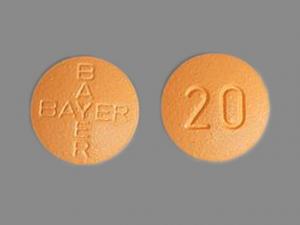Levitra Disease Interactions
There are 10 disease interactions with Levitra (vardenafil).
- Cardiovascular disease
- Renal dysfunction
- QT prolongation
- Priapism
- Alcoholism
- Hearing loss
- Retinitis pigmentosa
- Seizure disorders
- Liver disease
- PKU
PDE5 inhibitors (applies to Levitra) cardiovascular disease
Major Potential Hazard, Moderate plausibility. Applicable conditions: Hypotension, Cerebral Vascular Disorder, History - Cerebrovascular Disease, History - Myocardial Infarction
The use of phosphodiesterase-5 (PDE5) inhibitors is not recommended in patients with preexisting cardiovascular disease for whom sexual activity is inadvisable due to the potential cardiac risk. Physicians should also consider the vasodilatory effect of these drugs and whether they may adversely affect patients with underlying cardio- and/or cerebrovascular conditions, in particular those who have suffered a myocardial infarction, stroke, or life-threatening arrhythmia within the last 6 months; those with resting hypotension (BP < 90/50) or hypertension (BP > 170/110); and those with unstable angina associated with cardiac failure or coronary artery disease. There are no controlled clinical data on the safety or efficacy in such patients. Other adverse cardiovascular effects reported include angina pectoris, myocardial infarction, AV block, ventricular arrhythmia, tachycardia, palpitation, hypotension, postural hypotension, syncope, cerebral thrombosis, cerebrovascular hemorrhage, transient ischemic attack, cardiac arrest, heart failure, and hypertension. Many of these events occurred in patients with cardiovascular risk factors and during or shortly after sexual activity.
PDE5 inhibitors (applies to Levitra) renal dysfunction
Major Potential Hazard, High plausibility.
The plasma clearance of phosphodiesterase-5 (PDE5) inhibitors may be decreased in patients with severe renal impairment, resulting in drug accumulation. Therapy with these agents should be avoided in patients with severe renal disease or on renal dialysis. Dose adjustments might be needed based on individual renal assessment and tolerability if used in these patients.
Vardenafil (applies to Levitra) QT prolongation
Major Potential Hazard, High plausibility. Applicable conditions: Long QT Syndrome
Vardenafil prolongs the QT interval. Patients taking Class 1A or Class III antiarrhythmic medications or those with congenital QT prolongation, should avoid using this agent. Caution should be exercised if used in patients with congenital QT syndrome, or using other QT prolonging drugs.
PDE 5 inhibitors (applies to Levitra) priapism
Moderate Potential Hazard, Moderate plausibility. Applicable conditions: Myeloproliferative Disorder, Sickle Cell Anemia, Peyronie's Disease, Cavernosal/Penile Tissue Abnormalities
Prolonged erection greater than 4 hours and priapism (painful erections greater than 6 hours) have been reported during treatment with phosphodiesterase-5 (PDE 5) inhibitors. Priapism may result in penile tissue damage and permanent loss of potency if not treated promptly. These agents should be used cautiously in patients with conditions that may predispose them to priapism such as sickle cell anemia, multiple myeloma, or leukemia, and those with anatomical deformation of the penis (such as angulation, cavernosal fibrosis, or Peyronie's disease). If an erection persists longer than 4 hours, the patient should seek immediate medical assistance.
PDE5 inhibitors (applies to Levitra) alcoholism
Moderate Potential Hazard, Moderate plausibility.
Alcohol consumption may intensify the pressure-lowering effects of mild vasodilators, such as phosphodiesterase 5 (PDE5) inhibitors. Therefore, patients that consume alcohol should be warned to limit alcohol intake while receiving these agents.
PDE5 inhibitors (applies to Levitra) hearing loss
Moderate Potential Hazard, Moderate plausibility. Applicable conditions: Tinnitus
Use of phosphodiesterase-5 (PDE5) inhibitors has been associated with sudden decrease or loss of hearing, which may be accompanied by tinnitus or dizziness. Patients with hearing problems should stop taking these agents and seek prompt medical care.
PDE5 inhibitors (applies to Levitra) retinitis pigmentosa
Moderate Potential Hazard, Moderate plausibility.
Phosphodiesterase-5 (PDE5) inhibitors have been associated with transient impairment of color discrimination (blue/green) and blue- or color-tinged vision. These agents also inhibit phosphodiesterase-6 (PDE6), to a much lesser extent, which is involved in phototransduction in the retina. There are no controlled clinical data on the safety in patients with retinitis pigmentosa, a minority of whom may have genetic disorders of retinal phosphodiesterases. Therapy with these agents should be avoided in such patients.
PDE5 inhibitors (applies to Levitra) seizure disorders
Moderate Potential Hazard, Moderate plausibility. Applicable conditions: Seizures
The use of phosphodiesterase 5 (PDE-5) inhibitors has been associated with seizures. Therapy with these agents should be administered cautiously in patients with preexisting seizure disorders.
Vardenafil (applies to Levitra) liver disease
Moderate Potential Hazard, Moderate plausibility.
Vardenafil is cleared predominantly by hepatic metabolism. The pharmacokinetic disposition of this agent has not been assessed in patients with severe hepatic impairment. No dosage modification is recommended for patients with mild hepatic impairment, however, therapy with this agent should not be administered to patients with moderate to severe hepatic impairment. In patients with mild hepatic impairment a lower dose of the oral tablet might be used as initial therapy and the maximum dose should not exceed 10 mg.
Vardenafil (applies to Levitra) PKU
Moderate Potential Hazard, Moderate plausibility. Applicable conditions: Phenylketonuria
Vardenafil oral disintegrating tablet contains 1.01 mg phenylalanine per tablet. The phenylalanine content should be considered when this product is used in patients who must restrict their intake of phenylalanine (i.e. phenylketonurics).
Switch to professional interaction data
Levitra drug interactions
There are 514 drug interactions with Levitra (vardenafil).
Levitra alcohol/food interactions
There are 2 alcohol/food interactions with Levitra (vardenafil).
More about Levitra (vardenafil)
- Levitra consumer information
- Check interactions
- Compare alternatives
- Reviews (133)
- Drug images
- Side effects
- Dosage information
- During pregnancy
- Support group
- Drug class: impotence agents
- Breastfeeding
- En español
Related treatment guides
Drug Interaction Classification
| Highly clinically significant. Avoid combinations; the risk of the interaction outweighs the benefit. | |
| Moderately clinically significant. Usually avoid combinations; use it only under special circumstances. | |
| Minimally clinically significant. Minimize risk; assess risk and consider an alternative drug, take steps to circumvent the interaction risk and/or institute a monitoring plan. | |
| No interaction information available. |
See also:
Further information
Always consult your healthcare provider to ensure the information displayed on this page applies to your personal circumstances.


